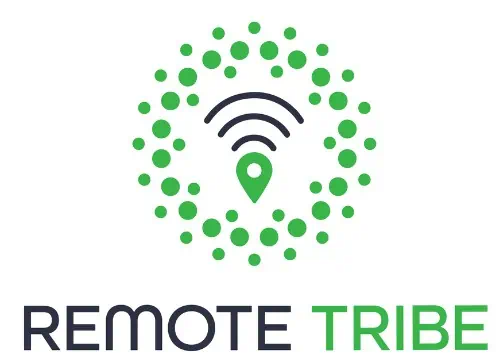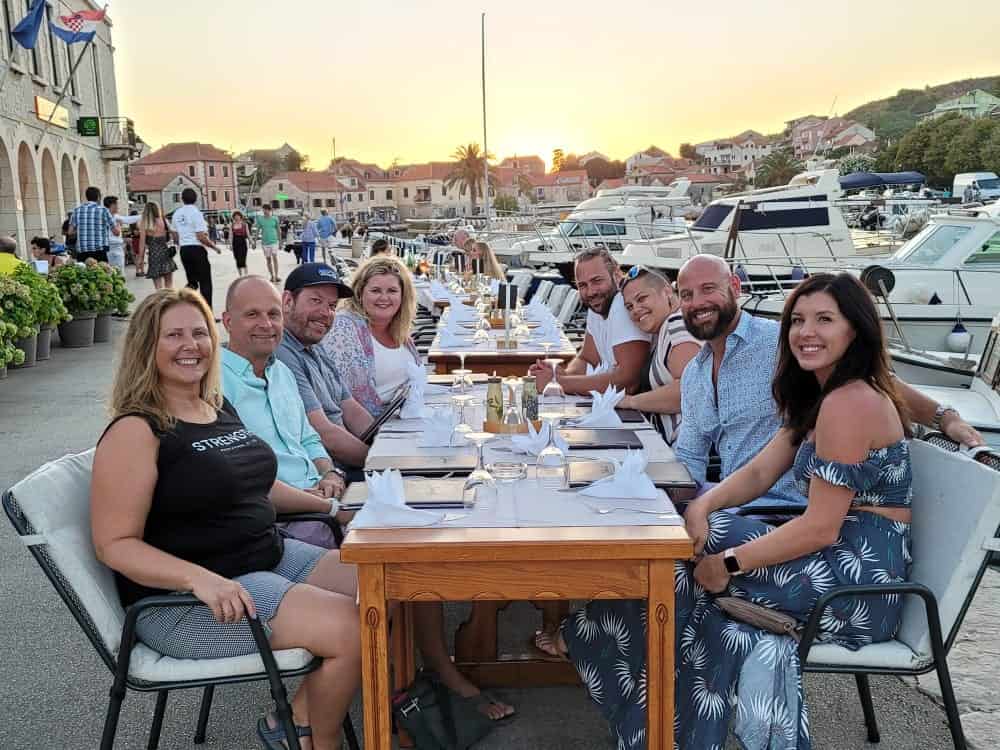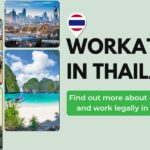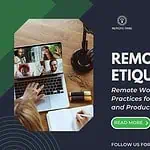Workation Meaning and rise in popularity
Workations, a mix between the words of “work” and “vacations,” offer a unique opportunity for laptop workers to blend their day-to-day laptop job with a travel experience. Unlike traditional vacations, where work is temporarily put on hold, workations are designed for remote workers to bring their work along, allowing for an extended stay of typically three to four weeks at a time.
With workations, remote working travelers can structure their time the way they want so they can meet their work obligations.
And the beautiful part of this? Then they can dedicate their non-working hours to relaxation, rejuvenation, culture, and exploration of the local destination.

Table of Contents
Many people who go on these workations refer to themselves as “part-time digital nomads,” as they do not entirely get rid of their possessions and lifestyle at home, but rather seek more authentic travel experiences that allow them to immerse themselves in new cultures and surroundings.
For example, consider a business professional from New York, USA, who decides to travel to Budapest, Hungary, for a month-long workation. With Hungary being six hours ahead of New York, during the workweek, they can dedicate their mornings and early afternoons to forming new friendships, engaging in hobbies and activities that interest them, or exploring the local area before logging in to start their workday around 2-3 pm CET.
This way, the weekend is already a holiday. Remote workers on a workation have the luxury of the end of the week and US holidays to take advantage and engage in the experiences that feed their soul, whether it’s discovering hidden gems, indulging in local food, or immersing themselves in the rich cultural heritage of Budapest.
The term ‘workation’ is a combination of ‘work’ and ‘vacation’, and refers to when people work while they are away. It is a working vacation.
Collins Dictionary Tweet
Growing popularity of workations, among remote workers and digital nomads
The COVID pandemic really added fuel to the fire with regard to travel and remote working.
First, more and more people have awakened to the fact that life is very short and very uncertain, so they can’t keep pushing off their dreams to another day.
Also, COVID “work from home” policies were a huge “proof of concept” lifestyle experiment all over the world, and it was a successful one in most of the industries. This strengthened. Companies saved up money for their real estate leases,
Additionally, more and more business professionals who can work remotely are realizing the incredible opportunity they have to experience amazing new destinations without sacrificing their careers, using all their Paid Time Off (PTO) and not waiting for retirement to realize their dreams of travel. All they need to do is do a little upfront planning and bring their work with them.
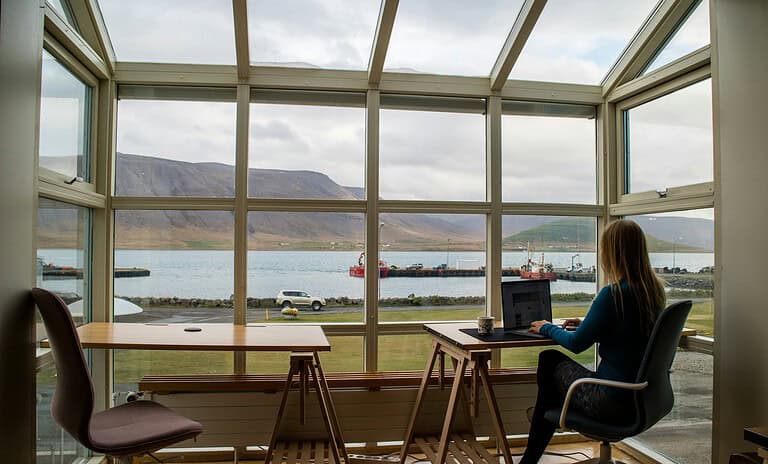
In a survey of over 1,000 Americans on workation, 67% of Americans took a workation to recharge mentally and emotionally, whilst 86% of them “agree” or “strongly agree” that a workation boosted their productivity.
Moreover, 81% of respondents said that a workation helped them become more creative. Source: Passport Photo Online
Benefits of Workations
The main advantege of a workation is its potential to improve work-life balance. By breaking free from the monotony of your office, you can prevent burnout and embrace a healthier routine that incorporates elements of relaxation and adventure.
The stimulation provided by new surroundings and cultural immersion should have a profound impact on your productivity and creativity.
For example, experiencing different environments and perspectives can fire a sense of inspiration, leading to innovative ideas and increased motivation. It sure does for us whenever we travel.
This new positive energy can transform into better engagement and increased performance at work or in your business, ultimately benefiting you but also you organization.
In addition to the personal and professional rewards, workations can also help you financially. By extending business trips or strategically working remotely from destinations with lower living costs (also called geo-arbitrage), people can potentially reduce their expenses. This cost-saving aspect make workations an attractive option for those seeking to optimize their resources while enjoying the benefits of travel.

Why not save up some money and invest it while you are seeing the world?
And last but not least, the cultural immersion aspect of a workation cannot be overstated. In fact, this is probably one of the BIGGEST benefits of being a remote worker on this type of holiday. Immersing in different cultures and customs can broaden your perspectives, challenge preconceived notions, and promote personal growth. This exposure to diverse ways of life can cultivate a deeper understanding and appreciation for the richness of the world around us, fostering a more inclusive and empathetic mindset.
Lisbon (left), is still one of the cheapest cities in Europe, highly appreciated by remote workers. A destination on the Atlantic Ocean with plenty of museums and a great food scene.
...and here are some more workation PROs
- Get a renewed charge of energy: new places, new energy. Choose the place where you live. Sunny places, beaches, mountain cabins, and so on.
- Avoid burnout: you won’t feel the pressure as much as being in the office.
- Engage in hobbies that fulfill you: how about skiing or surfing before or after.
- Stress reduction & self-care: most likely, you will afford care services you otherwise won’t in your home country.
- Cultural enrichment: Visit European Museums, see upcoming artists, and so on.
- Expand your knowledge: network and learn from other cultures.
Planning a Successful Workation
Choosing the right destination is important, and you should definitely spend some time doing research. Consider factors like cost of living, internet connectivity, and time zone compatibility. (this is a big one, especially if you work in PDT timezone)
The destination that fits your budget, is suitable for remote working, and fulfills your interests should be considered.
Then, you want to make sure you set up a productive workspace. Make sure that the place where you will be staying has a good quality desk and chair and a second monitor if possible (otherwise go for a portable one, they’re great). Some Airbnbs and even hotels now have the room ready for remote workers these days. Just look for the option “workspace” in the description.
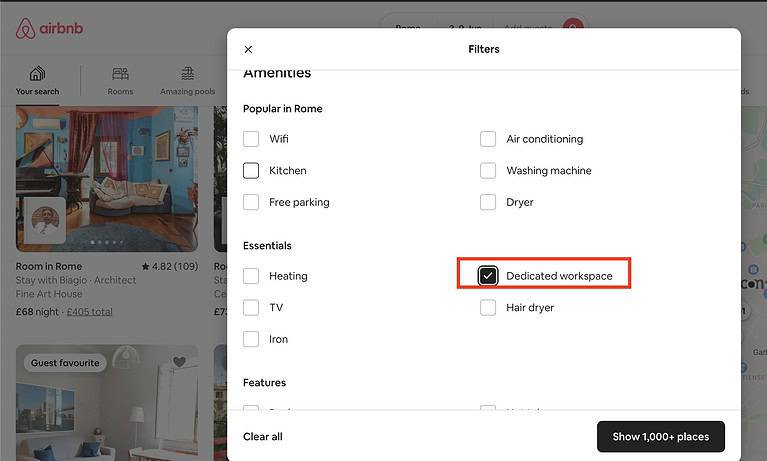
Hence, spend time vetting these short-term rental listings. Look out for comfortable living and remote working in my accommodations. Another great website I use that rents ready-to-live flats for remote workers is flatio.com which has ready-to-move in flats for remote workers and digital nomads alike who want to settle in fast and have the means to start working in day 1.
To improve your comfort even more, you can consider travelling with a few essentials to ensure a happy & comfortable experience while on the road, like an ergonomic seat cushion, a portable dual monitor, and a laptop stand.
Managing work expectations is a CRITICAL step in planning a workation. Make sure to communicate, plan and get feedback from employers or clients about work plans and setting realistic goals.
Another important piece of the puzzle for planning the workation is budgeting and logistics. You want to factor in additional costs like accommodation, transportation, and other small things like taxis, laundry (where applicable) and so on.
It’s important to set expectations for how much things are going to cost before you go and if you can, in fact, afford this workation or if it messes up with other financial plans you have. If you are curious about the living costs in a 2nd tier country in Europe, have a look at this blog on the living costs in Croatia, which is one of the most popular workation destinations in Europe.
This is where you can leverage experienced travelers (especially those with longer-term experience in your target destination), which is incredibly valuable. Try and dig in online forums for expats and nomads like reddit.com , Nomadlist, our blog and facebook groups to get an idea of what to expect in that country. Reddit is a never ending place
Kristie Sullivan's Journey from Corporate to Remote
Kristie Sullivan, an Executive Remote Worker and seasoned professional with two decades in the corporate world, tells about her transformative journey. Her initial dream of traveling was sidelined by the comforts and routine of corporate life.
The turning point, a personal midlife reevaluation, led her to rethink her approach to work and life. Kristie’s story is an inspiration to many who feel tethered to traditional career paths but yearn for more travel and freedom. Find out more about her story on her blog.
Legal and Tax Impplications of a Workation
Understanding the legal and tax implications of working remotely(more European workation spots here) in different locations is very important for the remote worker who has or wants to start the journey.
For domestic workations within one’s home country, tax obligations remain mostly the same, but it’s essential to track the number of days spent in each state or locality due to potential tax requirements for extended stays. Immigration and visa requirements are generally not an issue for domestic travel and remote work.
So international workations can be more complex, with tax implications and potential issues arising if one’s stay in a foreign country exceeds a certain number of days, typically around 183 days in a tax year.
Most countries have specific visa requirements for work-related activities, even if the individual is not employed by a local company. In some cases, a tourist visa may be enough for short workations, but in others, a specific visa or work permit may be required.
Regardless of the workation location, it’s super important to be compliant with data privacy and security regulations, especially when handling sensitive or confidential information. This may involve using secure connections (like a VPN), following data protection protocols from your company, and adhering to industry-specific regulations.
Moreover, when working abroad, even remotely, you may be subject to the labor laws and employment regulations of the host country, including aspects like the minimum wage, overtime rules, and workplace safety standards.
While the legal and tax implications may be less pressing for shorter workations of a month or less, exercising caution and due diligence is still essential. Try to consult with tax professionals or legal advisors who can provide valuable guidance, especially for international workations or extended stays.
Checkout the video below from our Youtube Channel with Kristie about Workations
Tips and Best Practices for a Successful Workation
Packing some extra essentials when going on a workation, is definitely something to consider, I can tell you from my 7 years+ of digital nomading experience.
For example, consider items like noise-canceling headphones, a portable power bank, a foldable keyboard, a mouse, mouse pads and so on. The laptop stand is also a must have. Depending on your destination, you might also need international adapters and a sturdy backpack to carry your essentials.
Building a Support Network Connecting with other digital nomads or remote workers can be very useful during a workation. Join online communities or attend local meetups to share experiences (see our favourites above), swap tips, and make new friends. If you’re traveling with a spouse, friends, or as part of a group workation, you’ll have a built-in support system. Even for shorter workations or solo trips, fostering these connections can provide a sense of community and valuable insights.
Stay flexible and I mean it. Flexibility in a workation means embracing the unexpected. Flight delays, spotty Wi-Fi, or unforeseen circumstances can throw a wrench in your plans. Adopt a flexible mindset and be prepared to adjust your schedule or work location as needed. If you’ stay very rigid, then you have a high chance of getting frustrated. Roll with the punches, and you might discover hidden gems or exciting opportunities along the way. Unexpected things can happen especially when chaning locations if plan to switch accommodations or cities.
Top 3 workations we recommend
1. Dubrovnik, Croatia
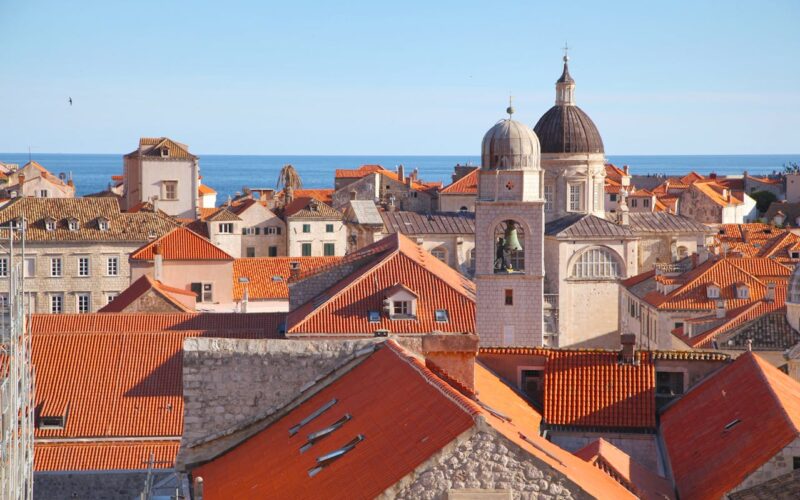

Russet rooftops, ringing bell towers, and lantern-lit limestone lanes make ancient Dubrovnik a visual spectacle and a pleasure to live in for a short workation. .
Its proximity to Italy, Montenegro, Albania, and Bosnia and Herzegovina, make this old town even more attractive for people who want to do city breaks over the weekend after working hard over the week. How about strolling the streets of Venice or coasting along Montenegro’s scenic shores? Yep, that’s possible from Croatia.
In terms of season, from mid-April to late September is the safest (also better prices), although you might want to visit during the warmer months to take advantage of the area’s lovely shingle beaches. From May to September, you’ll have to squeeze past throngs of people as you stroll along the stunning Stradun, the city’s main promenade made of ivory-white limestone, and the imposing city walls.
Prices in Dubrovnik are “spicy”. Moreover, as of January 1st, 2023, the official currency of Croatia is the Euro.
To give you an idea of the living costs, the price of a single dish can range from €18 to €30. For those seeking a fuller dining experience, adding a glass of wine or a soft drink alongside a side dish elevates the culinary journey, with the total bill per person averaging around €35, excluding the dessert.
A pint of domestic beer, poured with local pride,has a price tag ranging between €5 and €8.
When it comes to the accommodation, it’s very hard to find something under €100/night which for Europe is a high price. Try to book the whole month or even negotiate with the hosts on Airbnb if possible.
For digital nomads, connectivity is key, and Dubrovnik delivers with reliable and affordable internet services. Plus, the locals are fluent in English and are hospitable.
And yes, let’s not forget about the scenery. Dubrovnik’s pristine beaches are great, while its rugged mountains are waiting for you to explore them.
